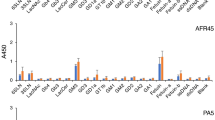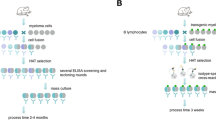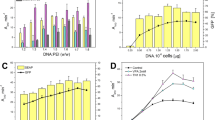Abstract
ANTICELLULAR sera able to block specific cell responses are important in the study of surface receptors. Particularly useful are antibodies against the human cellular antigens coded for by a specific chromosome, which can be prepared by immunising mice with mouse–human somatic cell hybrids containing defined human chromosomes1. We have applied this method to the study of the mechanism by which the presence of human chromosome 21 renders such hybrids sensitive to human interferon2. Interaction of an interferon with sensitive cells induces intracellular biochemical changes, including the formation of an inhibitor of protein synthesis, making the cell unable to support virus replication3,4. We have obtained antibodies to hybrid cells containing human chromosome 21, and these inhibit the response of live human cells to interferon. Our experiments indicate that chromosome 21 codes for a cell-surface component required as a specific receptor for human interferon.
This is a preview of subscription content, access via your institution
Access options
Subscribe to this journal
Receive 51 print issues and online access
$199.00 per year
only $3.90 per issue
Buy this article
- Purchase on Springer Link
- Instant access to full article PDF
Prices may be subject to local taxes which are calculated during checkout
Similar content being viewed by others
References
Buck, D. W., and Bodmer, W. F., in Human Gene Mapping, 6, 87–89 (Kaizer, Basel, 1975).
Tan, Y. H., Tishfield, J. A., and Ruddle, F. H., J. exp. Med., 137, 317–330 (1973).
De Clercq, E., and Stewart, W. E., II, in Selective Inhibitors of Viral Functions (edit. by Carter, W.A.), 81–107 (Chemical Rubber Co., Cleveland, 1973).
Revel, M., et al., in Perspectives in Virology, 9, (edit. by Pollard, M.), 233–248 (Academic. New York, 1975).
Tischfield, J. A., and Ruddle, F. H., Proc. natn. Acad. Sci. U.S.A., 71, 45–49 (1974).
Bash, J. A., Dubiski, S., and Cinader, B., Int. Archs Allerg., 47, 369–379 (1974).
Havell, E. A., and Vilcek, J., in The Production and Use of Interferon for the Treatment and Prevention of Human Virus Infections, In Vitro monogr. No. 3, 47, (Tissue Culture Association, 1974).
Tan, Y. H., Nature, 253, 280–282 (1975).
Tan, Y. H., Creagan, R. P., and Ruddle, F. H., Proc. natn. Acad. Sci. U.S.A., 71, 2251–2255 (1974).
Nicolson, G. L., in Membrane Research (edit. by Fox, C. F.), 53–70 (Academic, New York, 1972).
Bermann, B., and Vilcek, J., Virology, 57, 378–386 (1974).
Besancon, F., and Ankel, H., Nature, 252, 478–480 (1974).
Kohno, S., Buckler, C. E., Levy, H. B., and Baron, S., IRCS Medical Sciences, 3, 57 (1975).
Rosenthal, L. J., and Shechmeister, I. L., in Tissue Culture Methods, and Applications, (edit. by Kruse, P.F., and Patterson, M. K.), 509–516 (Academic, New York, 1973).
Author information
Authors and Affiliations
Rights and permissions
About this article
Cite this article
REVEL, M., BASH, D. & RUDDLE, F. Antibodies to a cell-surface component coded by human chromosome 21 inhibit action of interferon. Nature 260, 139–141 (1976). https://doi.org/10.1038/260139a0
Received:
Accepted:
Issue Date:
DOI: https://doi.org/10.1038/260139a0
This article is cited by
-
Somatic cell mapping of the bovine interferon-? receptor
Mammalian Genome (1992)
-
Sublocalization on chromosome 21 of human interferon-alpha receptor gene and the gene for an interferon-gamma response protein
Somatic Cell and Molecular Genetics (1990)
-
Interferon receptors
In Vitro Cellular & Developmental Biology (1988)
-
Cell-mediated cytotoxicity in down syndrome: impairment of allogeneic mixed lymphocyte reaction, NK and NK-like activities
European Journal of Pediatrics (1988)
-
Regulation of cell growth by interferon
Cancer and Metastasis Review (1987)
Comments
By submitting a comment you agree to abide by our Terms and Community Guidelines. If you find something abusive or that does not comply with our terms or guidelines please flag it as inappropriate.



